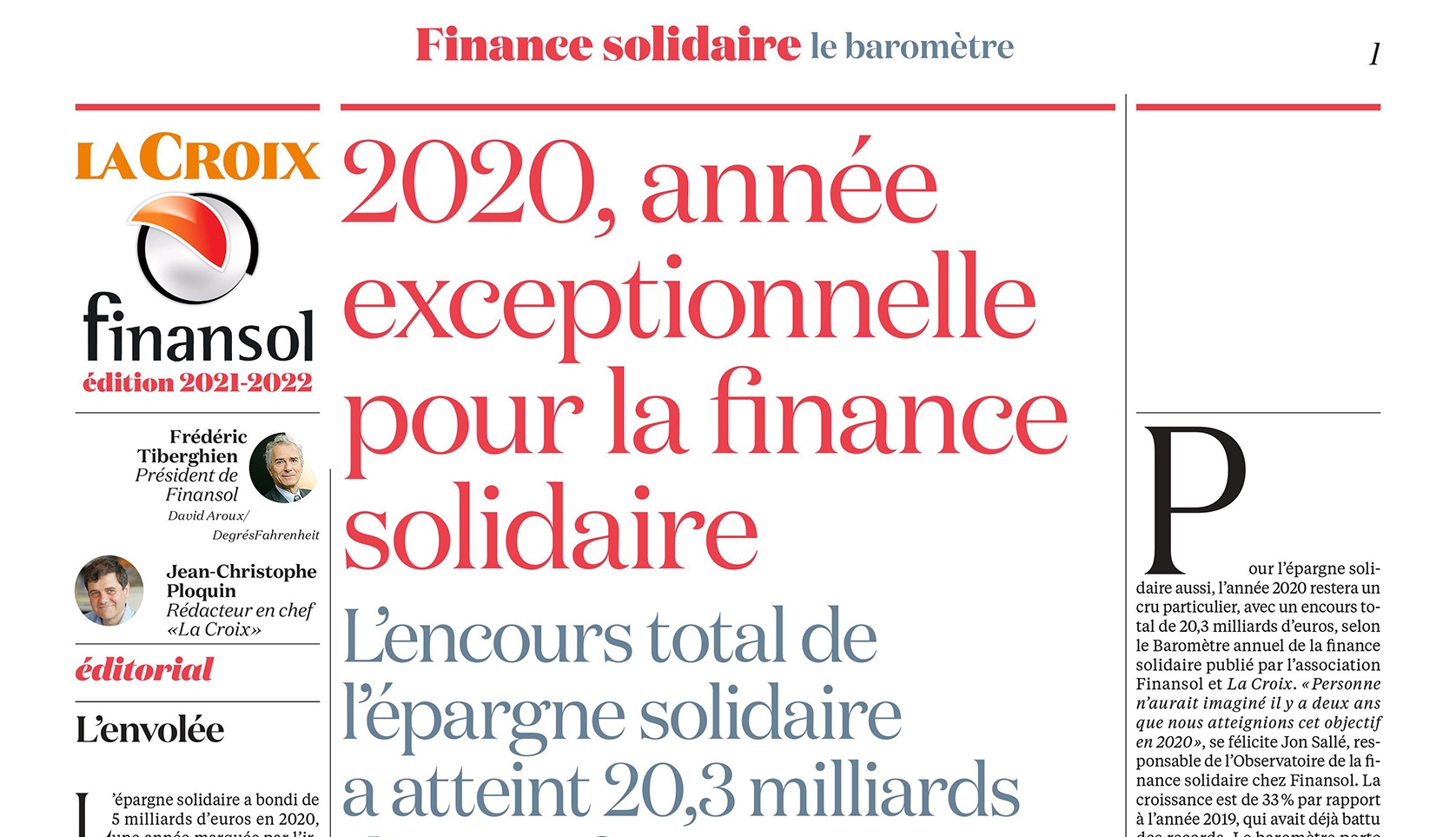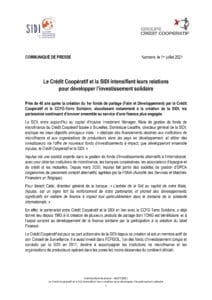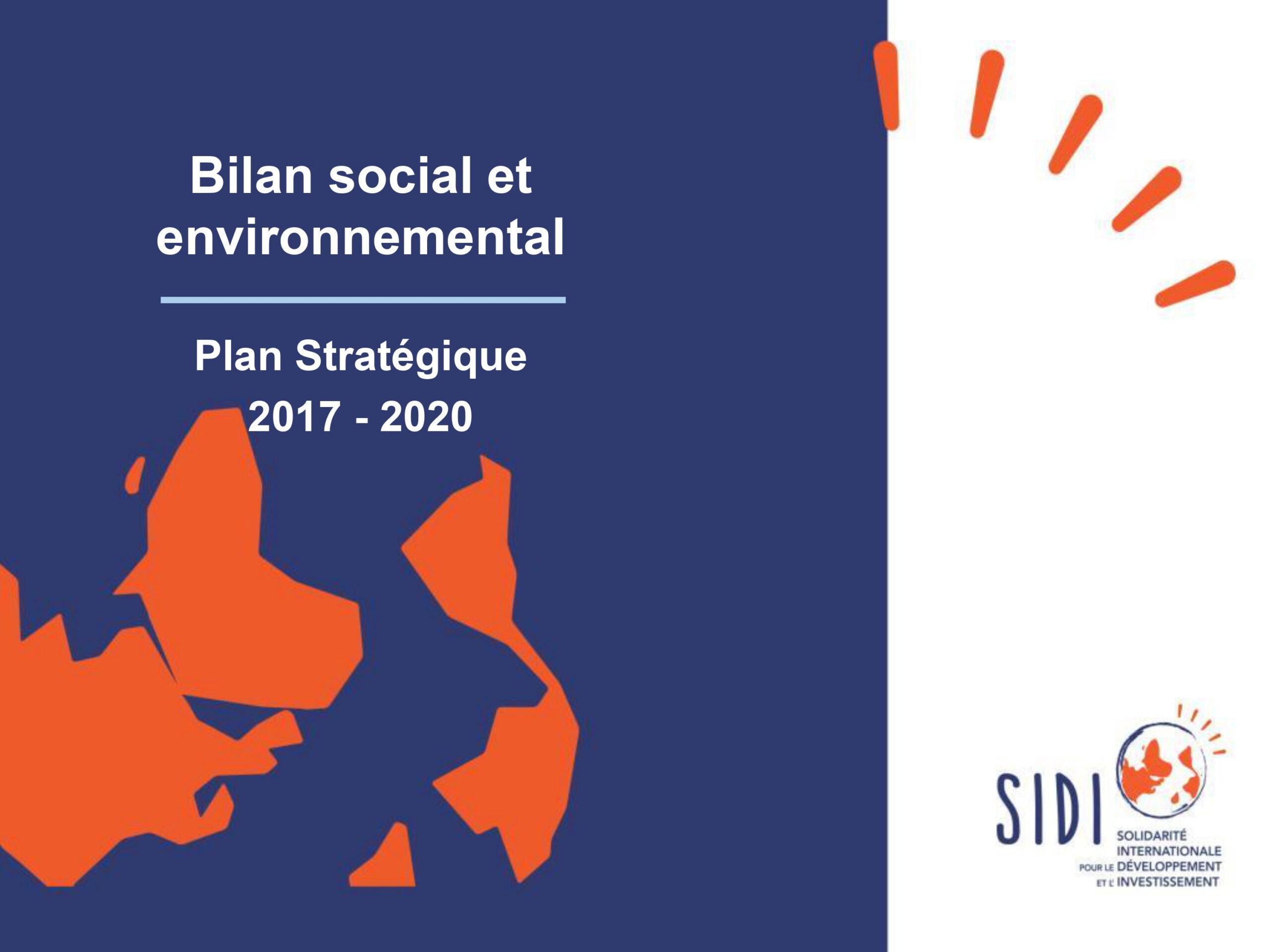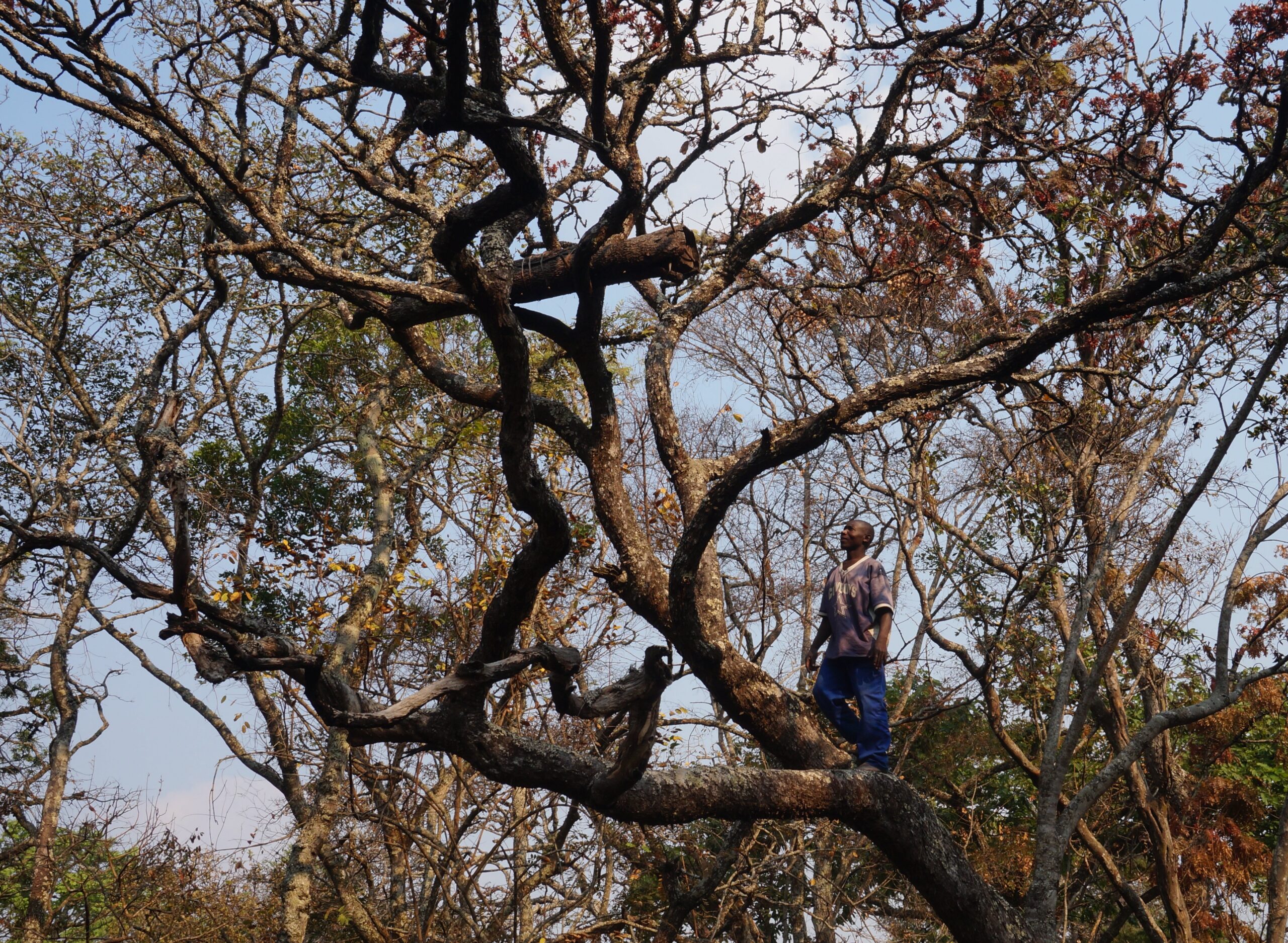A pioneer in solidarity investment in the South and East, SIDI publishes its annual report


[chapeau]Every year, La Croix newspaper, in partnership with the Fair / Finansol association, publishes the Solidarity Finance Barometer, which analyzes the major trends in the sector.[/chapeau]
Solidarity finance continues to make great strides: total outstanding solidarity savings reached 20.3 billion euros at the end of 2020, up 33% year-on-year!
Find out all about the trends and impact of solidarity finance in France, whatever the savings channel you choose: savings via your company, direct savings via a solidarity enterprise like SIDI, savings via your mutual or insurance company.
There’s also a focus on social finance initiatives and a list of Finansol-labeled investments.
 [CP] SIDI and Crédit Coopératif intensify their relationship for solidarity investment.
[CP] SIDI and Crédit Coopératif intensify their relationship for solidarity investment.
SIDI and Crédit Coopératif are pleased to announce the strengthening of their partnership in the service of solidarity finance.
By acquiring a stake in Inpulse Investment Manager, a microfinance fund management company and subsidiary of Crédit Coopératif, SIDI will be able to expand its range of services for its partners in developing countries. This will give SIDI considerable additional leverage to attract new investors via the impact funds it will be developing with Inpulse and Crédit Coopératif.
SIDI promotes finance that serves integral, socially just and ecologically sustainable development, based on the values of solidarity, trust, ethics and transparency. Its private and institutional shareholders give it the means to carry out its activities, and in return expect added value that is exclusively human, social and environmental.

This year’s Social and Environmental Review looks back over the four years of SIDI’s 2017-2020 Strategic Plan.
A wealth of information and figures highlighting the importance of the two pillars on which SIDI’s action towards its partners is based: financing and support.
An assessment that measures our progress, and that of our partners, in terms of ecological and social transition.
→ 139 partners in 36 countries
→ Growth in SIDI’s overall portfolio: from €25.1m in 2017 to €37.3m by the end of 2020
→ Africa remains SIDI’s No. 1 priority: 67% of partners, 56% of its portfolio by the end of 2020
→ Micro-finance institutions focused on rural financing, producer organizations mostly certified organic and fair trade
→ A focus on the most vulnerable populations: 46% of beneficiaries are women and 47% are from rural areas

[chapeau] Despite the health situation and the temporary suspension of field trips, SIDI is continuing its activities and, at the end of the year, opened a new partnership in Zambia with a company that processes and markets honey products. For SIDI, this is both an opening to a new country of intervention, and a major first in terms of support for the beekeeping sector.[/chapeau]
Since 1998, Forest Fruits has been collecting, processing and marketing beekeeping products for local and international markets. It buys raw honey produced by certified organic (Ecocert) Zambian beekeepers at a remunerative price, and processes it at its Mwinilunga factory. The social enterprise then transports the production to its packaging plant in Lusaka, where the finished product is exported to the sub-region (Zambia, Botswana and South Africa) and abroad. In addition to marketing forest honey for direct consumption, Forest Fruits is developing several types of processed honey-based products (beeswax flakes, candles, honey mustard, etc.). In recent years, thanks to technical support from FEFISOL[1], the company has developed the production of honey vinegar by fermenting lower-quality honey.
Most of the company’s business and its supplier beekeepers are located around the Mwinilunga district. In this isolated region with little economic dynamism, beekeeping is traditionally practiced and represents a considerable source of income for families. Thanks to Forest Fruits, producers benefit from higher remuneration and training to improve the quality of their honey and diversify their agricultural production (trials underway for tea tree production, for example). To develop the region, the company, which currently employs 63 people, also favors local recruitment, and training to enable its employees to upgrade their skills.
Forest Fruits’ business is directly linked to the bees’ honey production periods. Harvesting is spread over two periods of the year, depending on the flowering cycle of the Zambian forests in which the honey is harvested. In such periods, the company needs working capital to enable it to pay producers in cash. FEFISOL has been funding Forest Fruits campaigns since 2014, but this year the fund, which is in transition, was unable to commit to funding for 2021. SIDI has therefore decided to step in and support the next honey campaign by granting a line of credit of $750,000 over 12 months. This loan, backed by several regional and international buyers, will enable the company to purchase 600 tonnes of raw honey at a remunerative price for beekeepers as soon as the harvest is complete.
Despite the current context, SIDI continues to innovate by opening this partnership with Forest Fruits, to contribute to the economic, social and environmental development of a remote region of Zambia.
To find out more about the Forest Fruits social enterprise: https: //www.zambezigold.com/
[1 ] European Solidarity Fund for Africa, managed by SIDI.
[chapeau]Every year, La Croix newspaper, in partnership with the Finansol association, publishes theSolidarity Savings Barometer, announcing major trends in the sector. This year’s barometer is dedicated to projects that are part of the ecological and social transition, carried out with resources from solidarity savings.[/chapeau]
The solidarity savings sector in France is showing strong growth, with total outstandings of €15.6 billion in 2019 (24% more than in 2018), driven by an increase in subscriptions to solidarity savings products across all collection channels: employee savings, bank savings and direct equity investments in solidarity businesses. “The figures are quite exceptional,” comments Jon Sallé, head of Finansol‘s Solidarity Finance Observatory. Social utility solidarity enterprises (ESUS) like SIDI marked the strongest growth, with total outstandings rising from €651 million to €812 million between 2018 and 2019.
Energy is the area in which outstandings have risen the most, particularly for energy transition projects such as renewable energy production plants. This year’s barometer also features initiatives in the environmental field (biodiversity preservation, renewable energy production, support for farmers), which already accounts for at least a quarter of solidarity financing.
Click here to see the figures for the 2020-2021 barometer
"*" indicates required fields